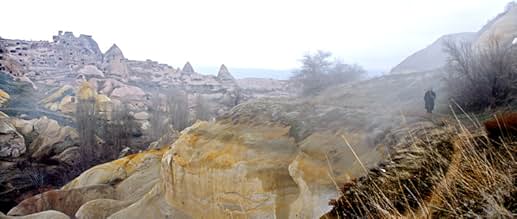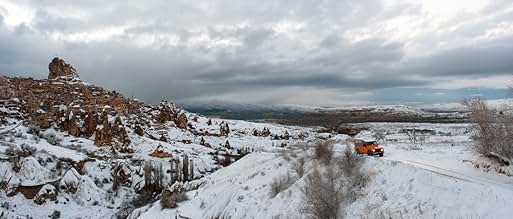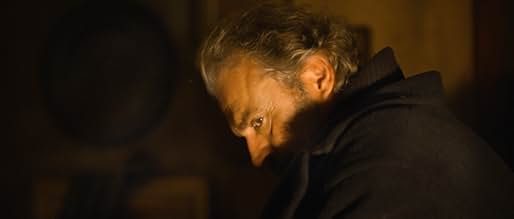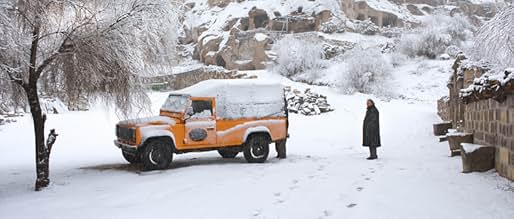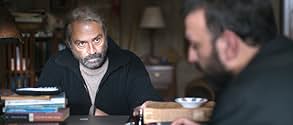NOTE IMDb
8,0/10
58 k
MA NOTE
Un propriétaire d'hôtel dans un village turc reculé est confronté à des conflits familiaux et à un locataire qui ne paye plus son loyer.Un propriétaire d'hôtel dans un village turc reculé est confronté à des conflits familiaux et à un locataire qui ne paye plus son loyer.Un propriétaire d'hôtel dans un village turc reculé est confronté à des conflits familiaux et à un locataire qui ne paye plus son loyer.
- Réalisation
- Scénario
- Casting principal
- Récompenses
- 19 victoires et 32 nominations au total
Serhat Mustafa Kiliç
- Imam Hamdi
- (as Serhat Kiliç)
Avis à la une
Winner of the prestigious Palme d'Or at 2014 Cannes Film Festival, Winter Sleep arrives with high expectations but succeeds amazingly well in living up to its new-found honour for this Turkish drama is simply one of the most engrossing, mesmerizing & satisfying narratives to surface on the silver screen in the past year, and is definitely one of the best films of 2014.
Set in Anatolia, the story of Winter Sleep concerns Aydın; the wealthy owner of a mountaintop hotel who was once an actor but has since fallen into the hibernation mode over the years. The plot covers the chaos his self-involved persona brings to his small kingdom as the animosity of his loved ones & the poor people under his reign begins surfacing once the winter approaches.
Directed by Nuri Bilge Ceylan, the film takes a very methodical, patient & firm approach with its narrative which does a stellar job in slowly unraveling the inner details of the various characters inhabiting this story. The entire story is an amalgamation of one conversation after another but it's how each discussion begins & ends plus seamlessly switches from one to another that makes it such an immersive experience.
The locations are wonderfully chosen, set pieces are finely detailed, the hotel itself creates a calm but secluded ambiance which becomes all the more suffocating on the advent of winter. Camera-work is mostly still yet effective plus the landscapes are beautifully photographed, its 196 minutes of runtime never really bothers for the most part, thanks to its breezy storytelling & the score makes its presence felt just when it's required.
Coming to the performances, every single actor here chips in strongly in their given roles & leave nothing to complain about. Haluk Bilginer delivers a magnificent performance as Aydın, and is brilliantly supported by Demet Akbağ & Melisa Sözen who play his sister & wife, respectively. The rest of the cast also shines since each character is deftly scripted & gradually developed which differentiates them from caricatures.
On an overall scale, Winter Sleep is an intensely gripping, masterfully told & exquisitely layered study of a self-righteous character that also takes an interesting look at failing relationships, old age regrets, class divides, and the morals of right & wrong. And despite its challenging runtime, dialogue-driven plot & slow-burn narration, it manages to be a truly immersive & absorbing cinema that's worthy of your time & money. Highly recommended.
Set in Anatolia, the story of Winter Sleep concerns Aydın; the wealthy owner of a mountaintop hotel who was once an actor but has since fallen into the hibernation mode over the years. The plot covers the chaos his self-involved persona brings to his small kingdom as the animosity of his loved ones & the poor people under his reign begins surfacing once the winter approaches.
Directed by Nuri Bilge Ceylan, the film takes a very methodical, patient & firm approach with its narrative which does a stellar job in slowly unraveling the inner details of the various characters inhabiting this story. The entire story is an amalgamation of one conversation after another but it's how each discussion begins & ends plus seamlessly switches from one to another that makes it such an immersive experience.
The locations are wonderfully chosen, set pieces are finely detailed, the hotel itself creates a calm but secluded ambiance which becomes all the more suffocating on the advent of winter. Camera-work is mostly still yet effective plus the landscapes are beautifully photographed, its 196 minutes of runtime never really bothers for the most part, thanks to its breezy storytelling & the score makes its presence felt just when it's required.
Coming to the performances, every single actor here chips in strongly in their given roles & leave nothing to complain about. Haluk Bilginer delivers a magnificent performance as Aydın, and is brilliantly supported by Demet Akbağ & Melisa Sözen who play his sister & wife, respectively. The rest of the cast also shines since each character is deftly scripted & gradually developed which differentiates them from caricatures.
On an overall scale, Winter Sleep is an intensely gripping, masterfully told & exquisitely layered study of a self-righteous character that also takes an interesting look at failing relationships, old age regrets, class divides, and the morals of right & wrong. And despite its challenging runtime, dialogue-driven plot & slow-burn narration, it manages to be a truly immersive & absorbing cinema that's worthy of your time & money. Highly recommended.
This movie feels like you're peeking into the lives of these characters, and it can be very awkward.
The story is, basically, a conflict between a landlord and a tenant. The main landlord is kind of an asshole. He's snobbish and condescending, but the tenant isn't the most likeable either.
These characters feel like people. Flawed and conflicted. Their story is more fascinating to watch that it would seem at first.
The film is very long and very slow, but instead of being boring, it's relaxing, despite how unrelaxed the characters may be (they spend a lot of the time arguing). It's also really tense. Tense and relaxing. Oddly nostalgic.
If I were to compare it to a more recent movie, that would be Hu Bo's An Elephant Sitting Still.
The story is, basically, a conflict between a landlord and a tenant. The main landlord is kind of an asshole. He's snobbish and condescending, but the tenant isn't the most likeable either.
These characters feel like people. Flawed and conflicted. Their story is more fascinating to watch that it would seem at first.
The film is very long and very slow, but instead of being boring, it's relaxing, despite how unrelaxed the characters may be (they spend a lot of the time arguing). It's also really tense. Tense and relaxing. Oddly nostalgic.
If I were to compare it to a more recent movie, that would be Hu Bo's An Elephant Sitting Still.
Mr Nuri Bilge Ceylan had made adventurous efforts in his movie "Winter Sleep". Rewardingly, Palme d'Or Awards was passed onto his hands in 2014. A stunning feature of this movie was the eloquence of major characters. Because of this distinct feature, the audiences need feel comfortable to catch up with a large amount of intellectual debates and accusative questionings between the characters, in order to tap into the characters' inner worlds.
During three hours and sixteen minutes, a rich and deep portrait of various emotional sufferings are gradually unfolded. The audiences are exposed to intense conflicts between the rich and the poor, a complacent brother and his critical divorcée sister, an egoistic husband and an unhappy young wife and also a naive philanthropist and a resentful villager. Also, there are explosions and accumulations of negative emotional outbursts such as distrust, prejudice, loneliness, fear, suffocation, delusion, cynicism, hopelessness and hatred.
While viewing these interpersonal tensions and emotional despairs, it seems to me that our characters were all wearing shackles which had stopped them from finding their true inner strength. For Aydin, the shackle was his distrust and emotional rigidity. For Necla, it was her disapproving attitude and reluctance to change. For Nihal, it was her pessimistic view of her future. For Hamdi, it was his deeply-rooted shame and hatred towards the rich. For Hamid's little son Ilysa, it was his inability to fight against social unfairness. For Hamdi's bother Ismail, it was his involuntary submissiveness and unresisting. And perhaps due to these emotional scars, they all felt deprived of freedom and thus pushed each other into corners in order to feel justified.
Mr Nuri Bilge Ceylan opened an abundance of philosophical discussions in this movie. Seemingly he was unwilling to provide effective solution to ease any of these social and interpersonal tensions depicted in the movie. Nevertheless, Mr Ceylan did examine Aydin's self-revelation after he clashed with his sister Necla and his wife Nihal. When Aydin's false ego was badly stricken, the loneliness and pain in Aydin's heart must have been unbearably agonizing. From that moment, the movie started to openly unveil Aydin's vulnerabilities. He contemplated at his parents' graveyard. His messy hair was flying nowhere in the snow, looking terribly sad. When he showed genuine care to the young motorcyclist, that warmth didn't returned back to him. The releasing of a wild horse back to Anatolia steppe could indicate his longing to loosen his own rigidity and forceful mind. While waiting for his run-away train to Istanbul, he frankly demanded the company of his assistance Hidayet. He paid attention to a dead fox lying beside the rails in the snow and even checked birds of prey on the nearby tree. He watched the dying rabbit pitifully during hunting. At the end of the movie, Aydin admitted to himself that he was unable to live through life without Nihal. At this point, when Aydin acknowledged his emotional vulnerabilities, it appeared that he regained his peace and order, and even kicked off his long-term writing project on "the History of Turkish Theatre". Aydin perhaps realized that he no longer needed to be the superior one who was emotionally distant to people and himself, who felt like a king by being a columnist in his imaged kingdom, who loved his own civilized manner to contrast others'clumsiness, who was relying on rigidity to feel strong
Overall, this is a thought-provoking movie, managed by a master director and performed by impeccable cast. I would love to watch this movie again after a few years, as I wish to comprehend more of its richness and depth when life rewards me with more personal experiences.
During three hours and sixteen minutes, a rich and deep portrait of various emotional sufferings are gradually unfolded. The audiences are exposed to intense conflicts between the rich and the poor, a complacent brother and his critical divorcée sister, an egoistic husband and an unhappy young wife and also a naive philanthropist and a resentful villager. Also, there are explosions and accumulations of negative emotional outbursts such as distrust, prejudice, loneliness, fear, suffocation, delusion, cynicism, hopelessness and hatred.
While viewing these interpersonal tensions and emotional despairs, it seems to me that our characters were all wearing shackles which had stopped them from finding their true inner strength. For Aydin, the shackle was his distrust and emotional rigidity. For Necla, it was her disapproving attitude and reluctance to change. For Nihal, it was her pessimistic view of her future. For Hamdi, it was his deeply-rooted shame and hatred towards the rich. For Hamid's little son Ilysa, it was his inability to fight against social unfairness. For Hamdi's bother Ismail, it was his involuntary submissiveness and unresisting. And perhaps due to these emotional scars, they all felt deprived of freedom and thus pushed each other into corners in order to feel justified.
Mr Nuri Bilge Ceylan opened an abundance of philosophical discussions in this movie. Seemingly he was unwilling to provide effective solution to ease any of these social and interpersonal tensions depicted in the movie. Nevertheless, Mr Ceylan did examine Aydin's self-revelation after he clashed with his sister Necla and his wife Nihal. When Aydin's false ego was badly stricken, the loneliness and pain in Aydin's heart must have been unbearably agonizing. From that moment, the movie started to openly unveil Aydin's vulnerabilities. He contemplated at his parents' graveyard. His messy hair was flying nowhere in the snow, looking terribly sad. When he showed genuine care to the young motorcyclist, that warmth didn't returned back to him. The releasing of a wild horse back to Anatolia steppe could indicate his longing to loosen his own rigidity and forceful mind. While waiting for his run-away train to Istanbul, he frankly demanded the company of his assistance Hidayet. He paid attention to a dead fox lying beside the rails in the snow and even checked birds of prey on the nearby tree. He watched the dying rabbit pitifully during hunting. At the end of the movie, Aydin admitted to himself that he was unable to live through life without Nihal. At this point, when Aydin acknowledged his emotional vulnerabilities, it appeared that he regained his peace and order, and even kicked off his long-term writing project on "the History of Turkish Theatre". Aydin perhaps realized that he no longer needed to be the superior one who was emotionally distant to people and himself, who felt like a king by being a columnist in his imaged kingdom, who loved his own civilized manner to contrast others'clumsiness, who was relying on rigidity to feel strong
Overall, this is a thought-provoking movie, managed by a master director and performed by impeccable cast. I would love to watch this movie again after a few years, as I wish to comprehend more of its richness and depth when life rewards me with more personal experiences.
A long theatrical play of dialogue and moods, thoughts and reflections, the absence of love or purpose, mixed with unchallenged and unsolved social inequalities, all placed into beautiful shots amid an astonishing natural environment. Very well played, with an almost unbearable iceberg of surpressed emotions and intellectually justified lack of action. Thought-provoking and emotionally touching, even if in a disturbing way.
Ceylan's film is a film about the inherently destructive aspects of 'pride', tired old traditions, antiquated thinking, dishonesty (or at least being intentionally disingenuous), and letting your bitterness and resentment fester until it eats away too much of you and leaves you at odds with those closest to you, if not everyone.
Le saviez-vous
- AnecdotesDirector Nuri Bilge Ceylan revealed that he had more than 200 hours of material and his original cut was 4 hours 30 minutes. He then "worked hard" to make it down to 3 hours 15 minutes.
- GaffesThe books in Aydin's hands change during the argument with his wife.
- ConnexionsReferenced in Estrenos Críticos: Perdida, Sueño de Invierno y One Direction (2014)
- Bandes originalesSonata in A major D959 - Andantino
Composed by Franz Schubert
Meilleurs choix
Connectez-vous pour évaluer et suivre la liste de favoris afin de recevoir des recommandations personnalisées
- How long is Winter Sleep?Alimenté par Alexa
Détails
- Date de sortie
- Pays d’origine
- Site officiel
- Langues
- Aussi connu sous le nom de
- Sommeil d'hiver
- Lieux de tournage
- Sociétés de production
- Voir plus de crédits d'entreprise sur IMDbPro
Box-office
- Montant brut mondial
- 4 018 705 $US
- Durée3 heures 16 minutes
- Couleur
- Mixage
- Rapport de forme
- 2.35 : 1
Contribuer à cette page
Suggérer une modification ou ajouter du contenu manquant


